The Definitive 2025 Guide to Advertising in India: Newspaper, Cinema, Digital, Outdoor & Television Explained

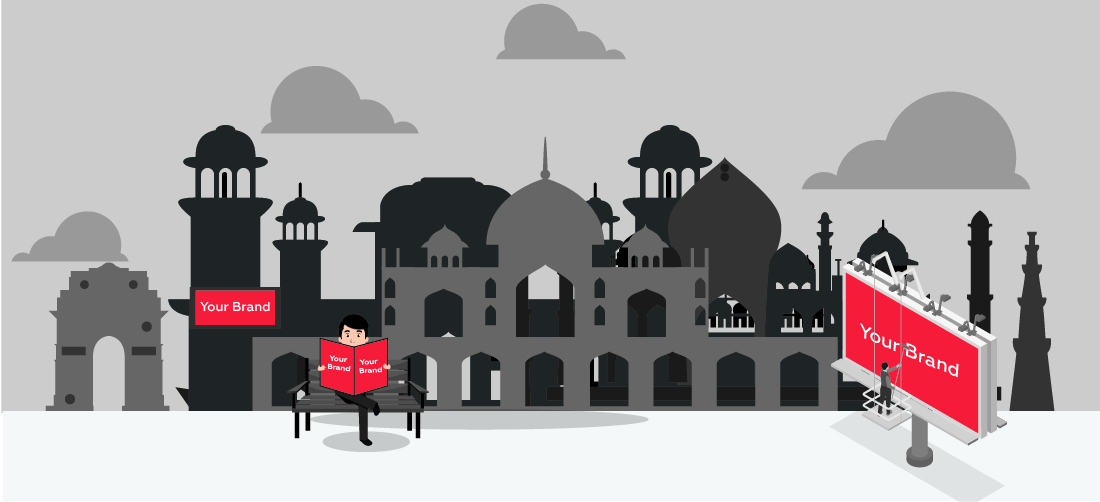
Traveling through the badlands of India is a mass of whirlpool changes! Every day presents a fresh face; with the consumer base growing larger, offering more media avenues utilizes a channel with a weathered pattern; the brands must be wise in selecting their channel for advertising, whereby it would be able to make a strong appearance and give a return on investment.
The primeval truthfulness of the newspaper, the avenue enchantments of the movie screen, and the lethally projected advertisements on the billboard that make it instantly observable, while TV imagination-type and digital media are mass-produced pretty fast, all of them perform their unfailing roles in the ad environment.
Supported by the most recent TAM Media Research figures and industry insights, this in-depth guide dissects the costs, benefits, audience targeting, and strategic implications of the five leading advertising media in India in 2024. As a brand manager, marketer, business enterprise owner, or media planner, this guide will assist you in comprehending where and how to allocate your advertising budget for the greatest returns.
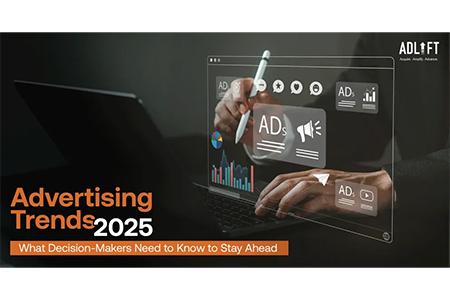
1. Newspaper Advertising in India: The Trusted Classic Reinvented
Why Print Media Still Matters
In a world ruled by digital and social media, it would appear that newspapers have lost their luster. Yet India's varied readership remains attached to print. TAM Media Research points out that regional dailies such as Dainik Bhaskar (Hindi) and Malayala Manorama (Malayalam) have dedicated and substantial followings, particularly in Tier 2 and Tier 3 towns and the countryside.
Newspapers are still among the only media offering a combination of trust, credibility, and geographic specificity. For brands interested in entering regional markets, older populations, or niche language markets, newspaper advertising is still a key channel.
Newspaper Circulation & Readership Trends
- Despite an overall decline in urban newspaper circulation, regional language newspapers report stable or even growing readership.
According to TAM, regional dailies reach over 70% of Indian households in their respective states.
The rise in digital news has complemented rather than replaced print, with many readers accessing both.
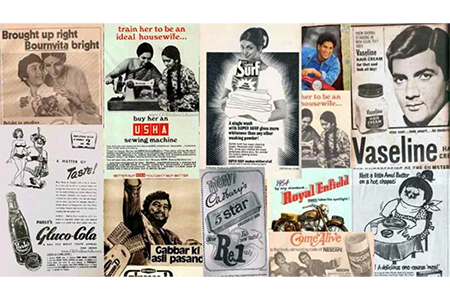
Cost Dynamics of Newspaper Advertising
Newspaper advertising rates are quite different based on several factors:
- Ad Size: Classified advertisements begin at Rs 162, display advertisements are more expensive based on the area (quarter page, half page, full page).
Placement: Front-page and prime-section advertisements (e.g., business section, lifestyle) cost more.
Circulation and Reach: Mass urban coverage, national dailies like The Times of India are expensive; regional newspapers cost less.
Frequency: Multiple ads usually incur a discount.
The full-page advertisements in major national dailies can be more than ₹63 lakh, though local newspapers provide packages suitable for lower budgets.
Types of Newspaper Ads and Their Impact
| Ad Type | Description | Best For |
|---|---|---|
| Classified Ads | Text-only, low-cost, suitable for quick announcements | Job postings, real estate, sales |
| Display Ads | Visual ads with images, color, and logos | Brand awareness, product launches |
| Innovative Ads | Ear panels, pointer ads, newspaper jackets | High-impact, attention-grabbing campaigns |
Strategic Benefits of Newspaper Advertising
- Local Targeting: Target city, district, or language clusters for targeted marketing.
Credibility: Advertising in respected publications generates consumer trust.
Cost Efficiency: High reach per rupee, particularly with regional targeting.
Flexibility: Ad size and frequency that scales fit all budgets.
Best Practices for Newspaper Ads
- Craft short, compelling headlines.
Visuals are bold, with much white space, making the early eye very comfortable.
Simplicity helps with clear CTAs like "Call now" or "Visit our website."
Bookings can be made up to 3-5 days ahead for premium placement.
Collaborate with agencies such as Excellent Publicity for the best rates and creative input.
2. Cinema Advertising: Where Brand Stories Come Alive
Capturing Attention in a Distraction-Free Zone
Cinema advertising offers a unique platform where the audience is captive and focused, removed from ubiquitous distractions like smartphones or multi-tasking. Such an environment enables individuals to recall the message more easily and internalize it.
Multiplexes such as PVR, INOX, and local multiplex chains are directly targeted to city youth who have good money to splurge, just the kind that lifestyle and entertainment brands are looking for.
Trends in Cinema Advertising
- Integration of ads with movie content and promotions.
Use of immersive technologies like 3D visuals and VR experiences.
Expanding formats beyond traditional commercials: lobby branding, digital displays, and experiential zones.
Advertising Costs and Formats
Typical cinema advertising costs include:
- Screen Time: ₹5,000 to ₹50,000 per screen per week.
Lobby Displays: Additional fees for posters, digital panels.
Brand Activations: Customized experiential marketing priced per scope.
Cost-effectiveness and high engagement make cinema an ideal platform for launching new products, especially in the FMCG, fashion, and entertainment sectors.
Why Cinema Advertising Works
- Undivided viewer attention drives higher recall.
Emotional storytelling aligns well with cinematic experiences.
Targeted showtimes and locations help reach niche urban audiences.
Innovative ad formats increase interactivity and brand memorability.
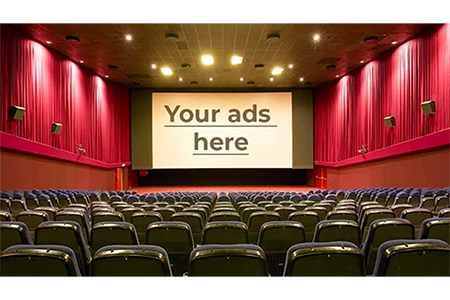
3. Digital Advertising: Powering India’s Ad Revolution with Data-Driven Precision
Explosive Growth Backed by TAM India Data
Online advertising is the most rapidly growing media category in India's advertising landscape. Digital ad impressions jumped by a whopping 43% between January and March 2023 and July–September 2023, TAM Media Research states. It's a matter of greater internet penetration, with people having smartphones in their hands and watching more things online.
In this wave, the Services category, education, finance, travel, and the like, alone accounted for more than 51% of total digital ad impressions during the July and September quarters. Service companies rely on online marketing to bring customers first.
Additionally, online retailers drove growth, and the industry saw a 34% spike in digital ad impressions in 2023 from 2022, indicating how India's retail shopping boom online is driving online ad expenditure.
Leading Platforms & Formats
India's online advertising is controlled by a handful of major platforms that provide distinct targeting and engagement features:
Search Engine Marketing (SEM):
Google Ads remains the benchmark for intent-based advertising. Companies can display ads that target keywords consumers actively search for, with high purchase intent. The channel leads in driving conversions and quantifiable ROI.
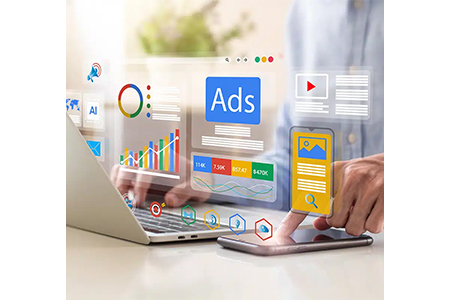
Social Media Advertising:
Properties like Facebook, Instagram, Twitter, and YouTube own the Indian user attention. They provide demographic, interest, behaviour, and location-based specificity for targeting with which the brands can build awareness, engage leads, and stimulate sales. Influencer collaborations and UGC campaigns provide tangible points of interaction.
Programmatic Advertising:
Real-time bidding and programmatic buying of ad space allow for efficient budgeting and optimization of audience targeting. Programmatic purchasing uses machine learning to serve the appropriate ad to the appropriate user at the appropriate time with maximum effect.
Video & Interactive Ads:
There was once a period when this kind of content would snatch attention from people easily. However, short-form videos, polls, quizzes, and interactive banners largely maintain audience engagement these days. All the more reason being that platforms such as YouTube and Instagram Reels have already caught onto this, where content is meant to be fast, eye-catching, and easy on the hand.
Benefits That Make Digital Advertising Indispensable
Precision Targeting:
Every single advert online is able to be laser-targeted to precision using information on age, gender, location, device, browsing, and purchase behavior. This eliminates wasteful expenditure and makes more efficient conversion rates.
Real-Time Analytics and Optimization:
Real-time ad campaign information is the differentiator here compared to other media. Click-through rate, conversion, bounce rate, etc., can be tracked by marketing counterparts, and creatives, bids, or audience segments can be changed in real time to give ongoing optimization.
Flexible, Scalable Budgets:
From small pay-per-click campaigns to massive brand presence campaigns, web advertising has a budget of any size. Advertisers can start small, monitor performance, and expand as results allow.
Expanding Reach via Smartphones:
India's exploding smartphone user base (over 900 million as of 2023), alongside cheap data plans, has made the internet accessible to all, driving consumption of digital content in both urban and rural India.
Diverse Creative Formats:
Digital allows a broad range of ad forms, static banner ads, carousel ads, stories, video ads, lead forms, and others, enabling brands to innovate and interact with audiences in new, creative ways.
Challenges Marketers Must Navigate
While digital advertising offers enormous opportunities, marketers should be mindful of:
Ad Fatigue and Banner Blindness:
Saturated audiences lose potency due to too much repetition. Rotating creatives and targeting messages at distinct audience segments combat fatigue.
Privacy and Regulatory Compliance:
With growing concerns around data privacy (the India Personal Data Protection Bill proposals are but one example), advertisers must follow transparent data handling practices along with strict consent and compliance mechanisms to retain user trust and avoid penalties.
Rising Cost per Click (CPC):
Competitive and popular sectors such as e-commerce, education, and finance have rising CPCs due to auction dynamics. Having great bidding tactics and audience segmentation is vital to maintaining ROI.
Platform Algorithm Changes:
Social media platforms will keep changing algorithms that change organic engagement and paid campaign performances. Flexibility and staying up-to-date are keys to success.
Best Practices for Indian Digital Advertisers
- Use Data for Audience Segmentation:
Accurately segment audiences using first-party data and platform signals and target the user by lifecycle stage and intent.
Create Mobile-Optimized, Culturally Relevant Content:
In India, multicultural populations exist-cum-different creatives are being localized into local languages, cultural settings, and device usage so that they can be harmonized well and, therefore, get maximum viewership.
Adopt Omnichannel Strategies:
Using repeat brand interactions can strengthen the points in the customer journey. From searches, social, programming, and video put the customer in repeat brand interactions in various touchpoints.
Invest in Creative Testing:
Run A/B tests on headlines, images, CTAs, and formats and allow quick optimization from performance results.
Focus on Measurement & Attribution:
Set up pixels for tracking, conversion tags, and multi-touch attribution models for measuring real impact for the campaigns and for subsequent replanning of campaign spends.
Partner with Experienced Agencies:
Collaborate with consultancies like Excellent Publicity that understand the peculiarities of the Indian market and have the capability to apply sophisticated tools and techniques.
4. Outdoor Advertising: Bold, Visible, and Hard to Miss
The Growing DOOH Revolution
Outdoor advertising continues to dominate India's ad mix, fueled by Digital Out-of-Home (DOOH) technology. Metros such as Mumbai, Delhi, Bengaluru, and Ahmedabad witness greater digital billboard, transit media, and experiential ad space installations.
Pricing and Popular Formats
| Format | Description | Typical Cost (₹) |
|---|---|---|
| Traditional Billboards | Static ads on roads, buildings | 20,000 to 1,50,000/month |
| Digital Billboards | Dynamic, changeable content | Higher than static billboards |
| Transit Media | Ads on buses, taxis, metro stations | Varies by route and vehicle |
| Experiential Ads | Interactive displays and events | Customized pricing |
Why Outdoor Advertising Works
- Huge reach in urban hotspots with high foot and vehicle traffic.
Builds sustained brand presence via constant visibility.
Real-time message updates are possible with digital formats.
Complements other media for integrated campaigns.
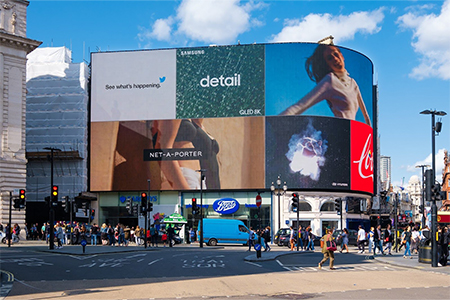
5. Television Advertising: Reigning Supreme in Reach and Impact
TV’s Massive Audience and Influence
Television remains a cornerstone of Indian advertising, delivering a 22% increase in ad volumes in 2023 compared to 2019. Leading sectors like Food & Beverages contributed 26% of ad volumes in early 2024, per TAM India.
Audience & Channel Preferences
- General Entertainment Channels (GEC) and News channels accounted for 55% of ad volumes.
Prime-time slots command premium rates.
National reach with local language channels allows multi-tier targeting.
Cost Considerations
TV ad costs depend on:
- Channel and program popularity.
Time slots (prime vs off-peak).
Duration and frequency of ads.
Top brands such as Hindustan Unilever and Reckitt Benckiser invest heavily to maintain a dominant presence.
Advantages and Strategic Use
- Unmatched mass reach across urban and rural India.
Combines audio-visual storytelling with brand building.
Builds trust and consumer loyalty.
Requires strategic media planning to optimize costs and impact.
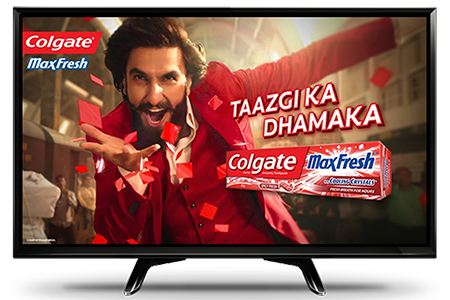
Integrated Advertising: Combining Media for Maximum ROI
An effective advertising strategy in India combines multiple media to leverage their strengths and mitigate weaknesses:
| Media | Strengths | Best Combined With |
|---|---|---|
| Newspaper | Local reach, credibility | Digital, Outdoor |
| Cinema | Engagement, emotional impact | Digital, TV |
| Digital | Targeting precision, analytics | TV, Outdoor, Print |
| Outdoor | High visibility, urban penetration | Digital, TV |
| Television | Mass reach, storytelling | Digital, Outdoor |
Excellent Publicity designs integrated campaigns to meet your business needs, budget, and target demographic. A combination of old and new media provides visibility for the brand and actual impact.

Conclusion: Your Advertising Success Starts Here
India's media landscape is varied and replete with potential. The individual strengths of every media help brands build campaigns that drive awareness, engagement, and sales.
Whether you need the familiar local touch of newspapers, the heartstrings tug of film, the accuracy of the internet, the boldness of outdoor, or the wide reach of television, Excellent Publicity is your guide in this media maze.
Let us craft your successful media plan. Call Excellent Publicity today and take your brand to the next level in India's dynamic market.
Frequently Asked Questions (FAQs)
The classified ads can cost your lakhs as ₹162, while full-page advertisements can fly away into crores depending on the national daily magazine one chooses!
These movies buy the single-minded attention of its audience, generate an emotional connection, and provide key urban-targeted reach at competitive prices.
Google Ads, Facebook, Instagram, Twitter, and YouTube top in reach and futuristic targeting features.
From ₹20,000 in small towns for old-style billboards to ₹1,50,000+ per month for digital banners in metros.
Yes; it has the mass reach and story power out of the most popular GECs and news channels.

